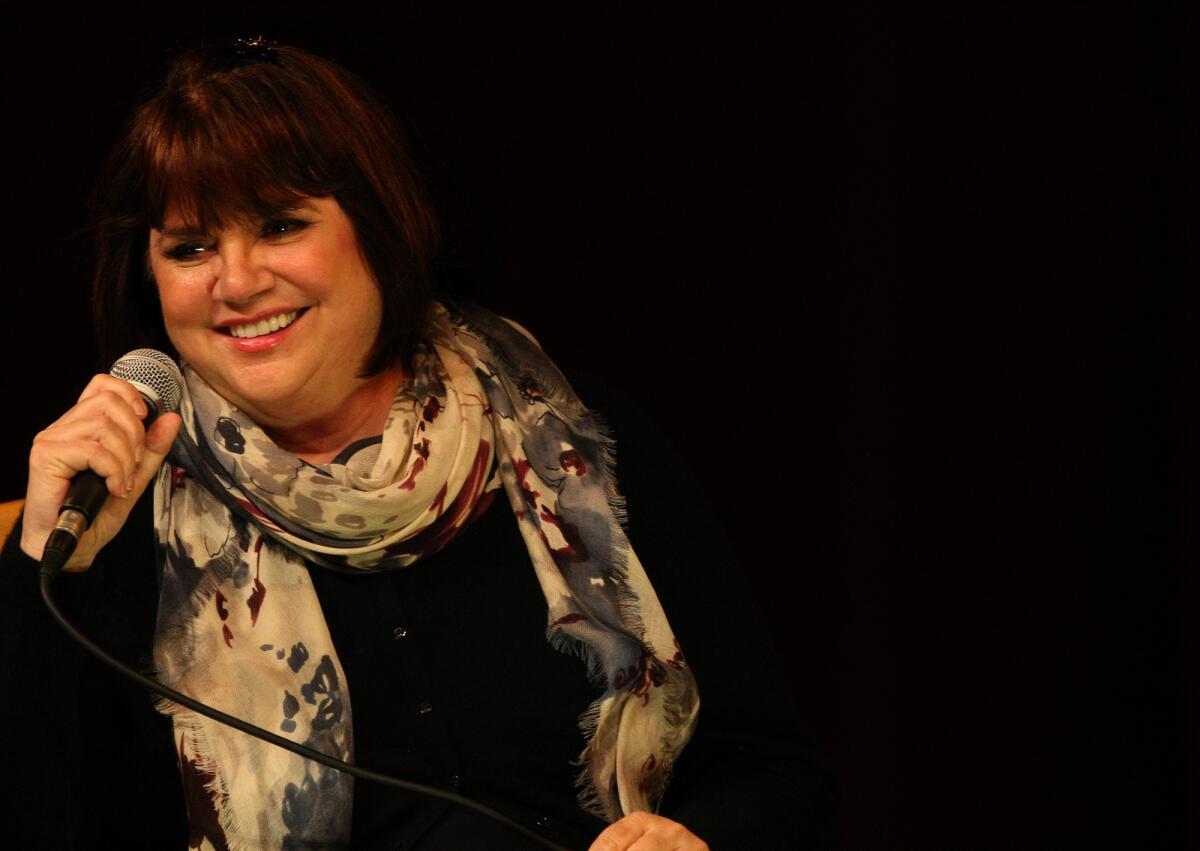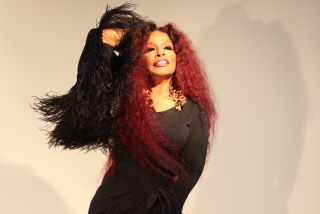Linda Ronstadt’s Hall of Fame induction caps off her ‘Duets’ release

Linda Ronstadt doesn’t quite get what all the fuss is about.
On Thursday she’s being inducted into the Rock and Roll Hall of Fame, an institution created three decades ago to extend formal recognition to the most influential artists in pop music history.
Still, she’s hard pressed to muster any real enthusiasm regarding the honor. “It’s nice,” she said apprehensively from her home in the Bay Area, then sheepishly explained.
PHOTOS: Iconic rock guitars and their owners
“It’s just something I never gave one thought to,” she said. “Other people seem to be way more interested [in the Hall of Fame induction] than I am. It’s like other awards that have come my way: I’m delighted to get them, and I’m very grateful. But I didn’t work for that reason.”
The timing of her induction is also somewhat ironic. After being overlooked by the Rock Hall for nearly 20 years, she was nominated only after announcing last year that she’s unable to sing again because of Parkinson’s disease.
Her condition also makes travel exceptionally grueling, and that’s the primary reason she said she won’t be attending the ceremony in Brooklyn, N.Y., at which Peter Gabriel, Nirvana, KISS, Yusuf Islam (formerly Cat Stevens), Hall & Oates and Bruce Springsteen’s E Street Band round out the 2014 class of Hall of Fame musicians.
To salute Ronstadt in absentia, Rock Hall organizers have assembled a female quintet including Ronstadt’s close friend and periodic musical collaborator Emmylou Harris, plus Stevie Nicks, Bonnie Raitt, Sheryl Crow and Carrie Underwood. Glenn Frey, who emerged from Ronstadt’s backing band with Don Henley in the early 1970s to form the Eagles, will give her induction speech.
She took on a book tour last fall to support the publication of “Simple Dreams: A Musical Memoir,” in which she focused on the musical highlights of her life. That outing was a strain, and since then the debilitating effects of Parkinson’s have increased.
PHOTOS: Daughters of rock stars
“The word ‘progressive’ has taken on a whole new meaning,” Ronstadt, 67, said with a laugh.
Discussing the Rock Hall for this interview was an exercise in polite obligation. She was far more animated discussing her new album coming out Tuesday, culling duets she recorded over a span of nearly 30 years with singing partners including Frank Sinatra, Henley, Dolly Parton, Harris, Bette Midler, James Taylor, J.D. Souther, Carl Jackson, Aaron Neville, James Ingram and Cajun singer and musicologist Ann Savoy.
The “Duets” album, for which Ronstadt has chosen the tracks and organized the sequencing, also includes one previously unreleased recording she made with bluegrass singer Laurie Lewis, an a cappella duet on the song “Pretty Bird.” It had been recorded for a tribute album to West Virginia folk-protest singer Hazel Dickens that was never released.
It’s no coincidence the album is arriving two days before the Rock Hall induction ceremony, but for Ronstadt, it’s only about the music, which offers a window into the way she works with a wide variety of singers.
“It’s so much fun,” she said, “so much better than just singing by yourself. It’s like a journey, or a road trip, which isn’t so much fun if you go by yourself. You have somebody to share the load with. The thing I like about singing duets is that I get things out of my voice I never get singing by myself.
“Singing with Aaron Neville, he pulled stuff out of my voice I never could have gotten, because if he’s providing XYZ, I have to put in ABC, and usually I don’t have to put in ABC,” she said. “I was surprised to find myself making all these sounds — it was like a ride at Disneyland, and each one is real different from the other, a different ticket. I learned how to do things with my voice I’d never have learned otherwise.”
PHOTOS: Stars and their Stratocasters
If you think Ronstadt’s gotten nostalgic about listening to her younger self sing, especially given her inability to do so now, think again.
Discussing her pairing with Harris on the Hank Williams country classic “I Can’t Help It (If I’m Still In Love With You)” from her 1974 album “Heart Like a Wheel,” which catapulted her to rock superstardom, she said, “Unfortunately, we sang it so much better every time since then.
“A lot of times I’ve duetted with Emmy to much greater effect. But that was the big hit, and you can’t leave off a big hit like that, right? I wanted a better duet, something off [their 1999 album] ‘Western Wall,’ but we could only fit so many tracks. That’s a sore point for me, because that doesn’t represent what Emmy and I did together.”
She structured the album to begin with the least ornamented performances, drawing three tracks from her 2006 collaboration with Savoy, “Adieu False Heart,” which turned out to be her final studio album.
“I could barely sing by then,” Ronstadt said. “I was really struggling and had to fight for every note. But we were so compatible as friends in terms of artistic sensibilities. We had long conversations about things we loved, art we loved, children we loved, lovers we loved, all different kinds of love. I got to put all those things in that record with Ann.”
The “Duets” album moves from the tracks with Savoy through country pairings with Parton — on the folk-country standard “I Never Will Marry” — Harris, Jackson and Lewis into her Southern California country-rock collaborations with Henley, Souther and James Taylor to her pop-soul tinged work with New Orleans singer Neville and R&B star Ingram. It wraps up with tracks from the Great American Songbook with Midler and the Chairman of the Board.
“The Frank Sinatra duet took me all day,” she said of her performance with him of “Moonlight in Vermont” from his 1994 “Duets II” album, when he was 79. “His voice was faltering at that point, but he’s such a great singer that even when his voice was faltering he had such great colors, and as a singer he was still dangerous.
“I had great respect for him as an artist, and I wanted to help. I could hear where he was struggling, and I tried to figure out little kinds of improvisations where I could bounce above and below his voice and surround him with a halo of sound. I think his voice sounded a lot like my dad’s, and it’s a voice I knew so well that I felt I would know how to shade in with his coloring. I also knew that song really well, from the Ella Fitzgerald and Louis Armstrong version, so I knew a lot of its possibilities. …
“To sing with Frank Sinatra in any capacity at all is overwhelming. Even though it came in a time when it came, you work with you’ve got, and you make the best of it. …
“I love the way it came out. I heard he apparently liked it a lot too.”
That’s the kind of anointing from on high that means something in Linda Ronstadt’s world.
Twitter: @RandyLewis2
More to Read
The biggest entertainment stories
Get our big stories about Hollywood, film, television, music, arts, culture and more right in your inbox as soon as they publish.
You may occasionally receive promotional content from the Los Angeles Times.










